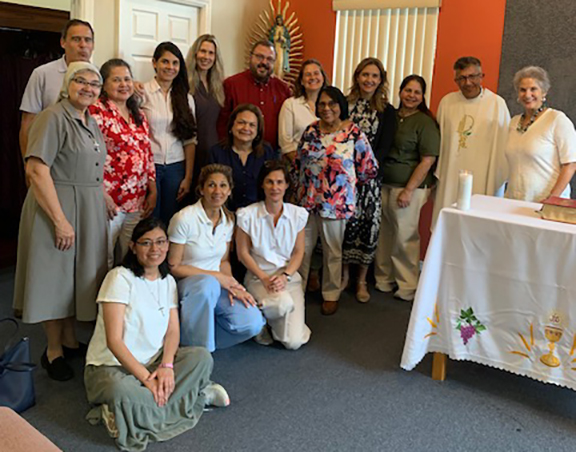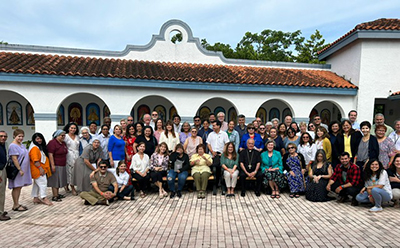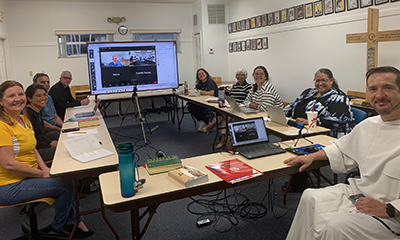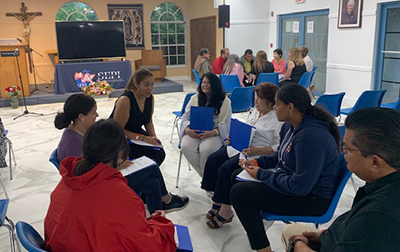Transforming Pastoral Leadership for Emerging Opportunities.
Barry University’s Master of Arts in Pastoral Ministry for Hispanics, offered in Spanish through a partnership with the Southeast Pastoral Institute, addresses a fundamental need to develop Hispanic lay and clergy leadership while fostering cultural sensitivity and cooperation among leaders throughout the Southeast. Since the 1980s, the program has graduated nearly 100 students. With support from a Pathways for Tomorrow grant (Transforming Pastoral Leadership for Emerging Opportunities. Meeting Hispanic Ministry Challenges through the Master in Pastoral Ministry for Hispanics), the university aims to expand the program through enhanced recruitment efforts and deeper engagement with the Hispanic Catholic community in nine Southeastern states. Planned improvements include increased compensation for instructors, hosting development conferences, expanding library holdings, and creating a web-based resource hub for Hispanic ministers.
Sr. Ondina Cortes, RMI, Ph.D., the initiative’s project director, outlines the program’s growing impact, noting that the latest graduating class is the largest in its history.
Briefly describe the project.
The program aims to expand and strengthen the Spanish-language Master in Pastoral Ministry for Hispanics, a collaborative effort between Barry University and the Southeast Pastoral Institute. Our goal is to equip Hispanic leaders with the educational and pastoral tools needed to respond to the growing challenges of ministry within the Hispanic community.
What have you learned so far?
We’ve discovered that there are very few schools nationwide offering a master’s in Pastoral Ministry entirely in Spanish with the remote option like ours. Beyond language, our focus is on the inculturation of theological formation to reflect the realities of our students and the context in which they will serve God’s people.
 We also noted the scarcity of online theological/pastoral resources in Spanish. To address this, we’ve expanded our Spanish eBook library, accessible through Barry University’s library. Thanks to the grant, this enhancement represents a significant contribution to the academic development of our students.
We also noted the scarcity of online theological/pastoral resources in Spanish. To address this, we’ve expanded our Spanish eBook library, accessible through Barry University’s library. Thanks to the grant, this enhancement represents a significant contribution to the academic development of our students.
What has surprised you along the way?
 This semester, we’ve had to increase the class size from the usual 10 to 15 students, exceeding the system’s capacity. Upon reviewing the course descriptions, we noticed that they were originally tailored for Miami’s Cuban population from 40 years ago. Since then, Miami has become very culturally diversified, thriving in multiculturalism. This prompted us to revise course descriptions and contents to better reflect the city’s current cultural landscape and incorporate contemporary theological approaches. Our SEPI team consisting of 10 people representing eight different Latin American countries, models this inclusivity. We are committed to ensuring that our staff’s cultural diversity reflects the population we serve.
This semester, we’ve had to increase the class size from the usual 10 to 15 students, exceeding the system’s capacity. Upon reviewing the course descriptions, we noticed that they were originally tailored for Miami’s Cuban population from 40 years ago. Since then, Miami has become very culturally diversified, thriving in multiculturalism. This prompted us to revise course descriptions and contents to better reflect the city’s current cultural landscape and incorporate contemporary theological approaches. Our SEPI team consisting of 10 people representing eight different Latin American countries, models this inclusivity. We are committed to ensuring that our staff’s cultural diversity reflects the population we serve.
What have been a few of your successes?
Our first academic conference was very successful, offering our students and other pastoral leaders the chance to engage with top-level presentations from renowned theologians. The event provided a valuable opportunity to discuss, reflect, and pray on key theological themes.
What are you learning that can help other schools?
 Our goal is to continue increasing enrollment in the master’s program while offering quality professional development that equips graduates for roles serving the Hispanic community within the Church. We also hope to foster increased interest in theological reflection and encourage deeper critical thinking on matters of faith within the Hispanics community.
Our goal is to continue increasing enrollment in the master’s program while offering quality professional development that equips graduates for roles serving the Hispanic community within the Church. We also hope to foster increased interest in theological reflection and encourage deeper critical thinking on matters of faith within the Hispanics community.